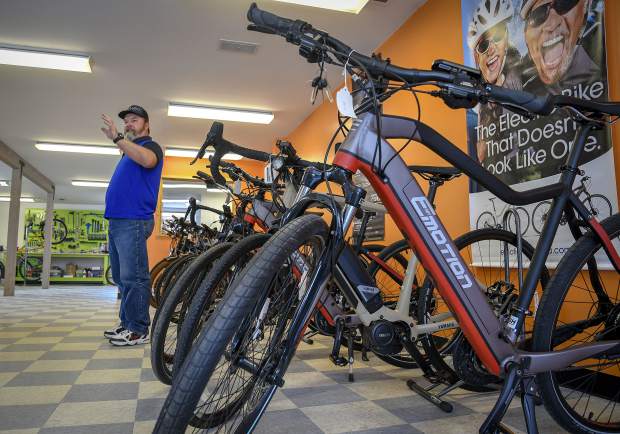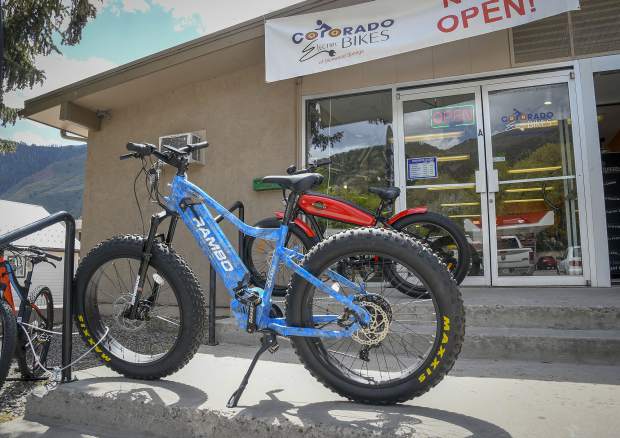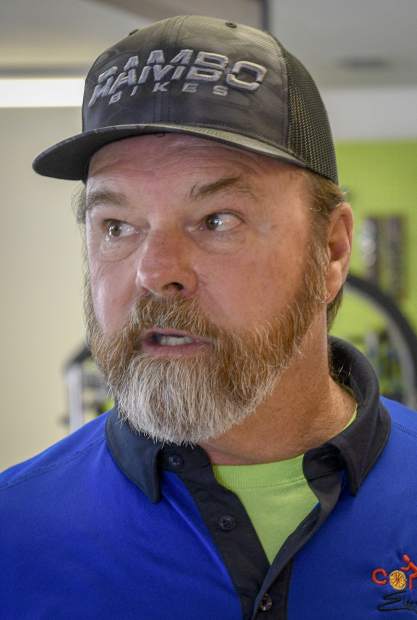
-

Dave Iverson, owner of Colorado Electric Bikes in Glenwood Springs, talks about the different models and types of electric bikes he offers at his new store on Grand Avenue.
Kyle Mills / Post Independent
Buy Photo -

One of Iverson’s top sellers is the Rambo Electric fat tire mountain bike.
Kyle Mills / Post Independent
Buy Photo -

Dave Iverson
Kyle Mills / Post Independent
Buy Photo
For the past two months, Glenwood Springs has had a dedicated store for electric-assisted bikes, and owner Dave Iverson says it’s going great.
Colorado eBike of Glenwood Springs, on Grand Avenue across the street from the Phillips 66 gas station, officially opened March 15.
E-bikes are not fully electric powered; they still need to be pedaled. But, for those who want to go farther with less effort, or who have physical limitations but want to get out and exercise, e-bikes offer a useful assist.
Iverson, who is 60, says many of his customers are his age and older, and just want a little boost.
“They still love to be on their bikes, but they want a little help. It’s that simple,” Iverson said.
E-bikes also offer benefit to others — those with injuries, amputees, or otherwise — who want the extra assurance, according to Iverson.
“You can ride e-bikes like a bike, a heavy bike, and get all the exercise you want. But, when you run out of gas, the bike will take you home,” Iverson said.
Iverson worked for RFTA for 32 years, until he parted ways with the company in September 2018. His best friend, Scott Manuppella, owner of Colorado E-Bikes in Grand Junction, was quick to suggest a new career path.
“He said, well, I guess it’s time for you to open up an electric bike store in Glenwood,” Iverson said.
And that was that.
Iverson has been enjoying e-bikes for six years, but didn’t have mechanical background, so he studied five weeks with the Barnett Bicycle Institute, and set to work getting a store ready.
“I’ve always liked working with my hands, and I didn’t have that with my last job (at RFTA). Now I do, and I’m digging it,” Iverson said. He also repairs standard bikes at his store.
E-bikes come in three classes. Class 1 is just pedal assistance, on several different levels. Class 2 adds a thumb throttle that can power the bike completely up to about 20 miles per hour, but not for very long, leaving the rider to still have to pedal up hill if the motor loses its charge.
Class three also has the pedal assist and thumb throttle, but can go up to 26 mph on its own thrust.
The most popular bikes Iverson sells are made by Rambo — fat tire, class 2 or 3 bikes built for off road in practically any condition. Iverson himself uses that type of e-bike on bow-hunting trips.
Eventually, Iverson wants to rent out e-bikes as well, particularly the electric fat bikes. With the fat tire, there is extra suspension, and the electric assist makes the bikes more stable, Iverson said.
Some of the serious mountain bikers and cyclists look down on the e-bikes, but Iverson says “to each his own.”
“It’s exactly like it was with skiing and snowboarding. Everybody looked down on the snowboarders, and now, it’s like, ‘Let’s all live together,’” Iverson said.
E-bikes haven’t been welcome everywhere. In cities and on trails, people have complained that e-bikers go too fast, or cause pedestrians and others to be unsafe.
E-bikes are restricted on some area trails, and RFTA has been weighing whether or not to allow them on certain sections of the Rio Grande Trail.
But Iverson dismisses the safety concerns as being a rider’s, not the e-bike’s fault.
“It’s all up to the individual rider. If you’re a jerk on a regular bike, you’ll be a jerk on an e-bike,” Iverson said.
